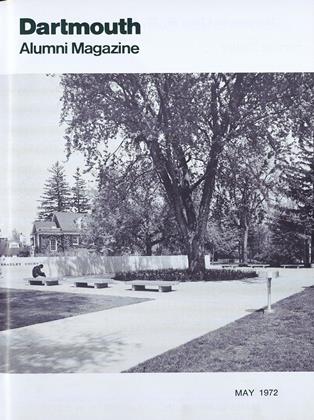HOWARD D. SAMUEL '46 is a trade union man, a prototype liberal who shares the New Leftist's concern over national priorities but not his cry "We're in worse shape than ever."
Along with the liberal's faith in progress goes a parallel conviction that it is not something that just happens, that effort and zeal are required to ignite change and persistence to keep the blaze alive.
As vice president of the Amalgamated Clothing Workers of America, Samuel labors unstintingly for better working conditions, better living conditions, and increased economic security for the 400,000 members of the union. As executive director of the Sidney Hillman Foundation, established to honor the memory of the union's first president, he administers a program of prizes, lectureships, grants, and reprints which promote civil rights, civil liberties, public welfare, and international understanding. The fund was set up as self-liquidating, to use up its assets by 1968, but some phases of the program continue on a modified scale.
Samuel's responsibilities as union vice president lie mainly in legislative and political fields. Though not technically a lobbyist, he works with Congressional committees and federal agencies, following closely the progress of measures of special interest to organized labor. He also directs the Union Label Department, a continuing activity aimed at dissuading retailer and consumer from purchasing men's garments, of foreign or domestic manufacture, not made by union labor.
A Wall Street investment broker's son, Samuel came to union work through journalism. The war interrupted his undergraduate years, but he returned to Hanover to break precedent by becoming editor-in-chief of The Dartmouth as a junior and to graduate Phi Beta Kappa, magna cum laude in history. After a year of graduate study, he took a job on a newspaper—which folded one week later. The ACWA had an opening in its publicity department, and Samuel has been with the union ever since, except for an early time-out to write a book and a year, in 1965, as vice president of the New School for Social Research. He became assistant president in 1960 and vice president in 1966.
As a private citizen, Samuel is as deeply involved in social issues and the political process as he is behind his desk on Union Square. He is an articulate advocate of liberal causes on governmental councils and private directorates. Recently named a trustee of the Carnegie Corporation, he is vice chairman of New York's Urban Coalition, a member of the governing board of Common Cause, a Republican appointee to the National Manpower Advisory Council and the Commission on Population Growth and the American Future, and a director of several educational organizations. He is a former national board member of the American Civil Liberties Union and was, until recently, an active Democratic Party worker in staunchly Republican Westchester County, where he lives with his wife and three sons.
"Educator-at-large" is a tempting Jabel for Howard Samuel. A rare consistency links his vocation and avocations: the drive for social reform and the elucidation of issues of public policy permeate both. He is co-author of two books. Congress at Work and Government in America, and editor of Toward a Better America, a collection of essays by prominent liberals. He has taught courses in Practical Politics at the New School. He is concerned about—and writes about—such diverse topics as the war in Southeast Asia, gun control, population and economic growth, manpower policy, and international trade.
He believes in the power of an informed electorate organized for the most effective pursuit of mutual goals. The dictum "in union there is strength" he applies to broader political strategy as well as work within the labor movement. "The first principle of lobbying is to lobby the lobbyists," he contends. "On broad issues, no one single group alone—be it peace, welfare, civil rights, labor, education, or conservationist—can have a significant effect on legislation." He attributes much of the impact of Common Cause to its role of coordinator.
Samuel sees social reform as an ongoing, though sometimes slow, process. "If there's one thing I am, it's an optimist," he stresses. "When people say we're in worse shape than ever, I think what it must have been like to be a black, a Jew, a laborer, a poor man in 1872, and what it's like now. Who would trade his situation now for what it was 100 years ago? Except, possibly, a WASP?" he adds with a smile.
"Society is more open now, opportunity more nearly equal than it was. Expectations are rising, and we're not fulfilling them fast enough, but we are making progress," says Howard Samuel, activist, idealist, realist—and optimist.
 View Full Issue
View Full Issue
More From This Issue
-
 Feature
FeatureA Valedictorian Changes His Mind
May 1972 By ALBERT WILLIAM LEVI '32 -
 Feature
FeatureMorton, Kilmarx Elected Charter Trustees
May 1972 -
 Feature
FeatureCharlie Zimmerman: An Appreciation
May 1972 By GEORGE H. COLTON -
 Feature
FeatureThe Nautical Nyes
May 1972 By MARY ROSS -
 Feature
FeatureAmerican Musicologist
May 1972 -
 Article
ArticleDeaths
May 1972
Features
-
 Cover Story
Cover StoryPoetry From the Heart
MARCH 1995 By Brooks Clark '78 -
 Feature
Feature...AND MANY DARTMOUTH YESTERDAYS
March 1962 By Edward Connery Lathem '51 -
 Feature
FeatureWOR's Early Bird
MAY 1965 By HOWARD L. WEINBERG '62 -
 Feature
FeatureTruckin' from the Meat Bar
July 1974 By JOHN GANTZ -
 Feature
FeatureMaking it Happen
JUNE/JULY 1984 By Peggy Sadler -
 Feature
FeatureThe Comprehensive Classroom:
JANUARY/FEBRUARY 1986 By Roger D. Masters and William C. Scott

